An Analysis of Business Ethics and Normative Theories in Retail
VerifiedAdded on 2020/11/23
|8
|2624
|65
Report
AI Summary
This report examines business ethics within the retail sector, focusing on ethical issues and the application of normative theories. It begins with an introduction to business ethics and its importance, particularly in the context of the food retail industry. The report then delves into various ethical issues, including philosophical, moral, and cultural aspects, such as pricing, consumer information, and labor practices. It explores normative theories, categorizing them into consequentialist and non-consequentialist approaches. Consequentialism, with a focus on utilitarianism, is discussed as a method to address ethical challenges by maximizing overall happiness. Non-consequentialism, specifically Kant's categorical imperative, is presented as a framework emphasizing duty and moral obligation. The report also addresses ethical dilemmas and the impact of internal and external environmental factors on business conduct. Finally, it concludes with recommendations for improving ethical practices in the food retail sector, emphasizing the importance of ethical sourcing, government guidelines, and transparency.
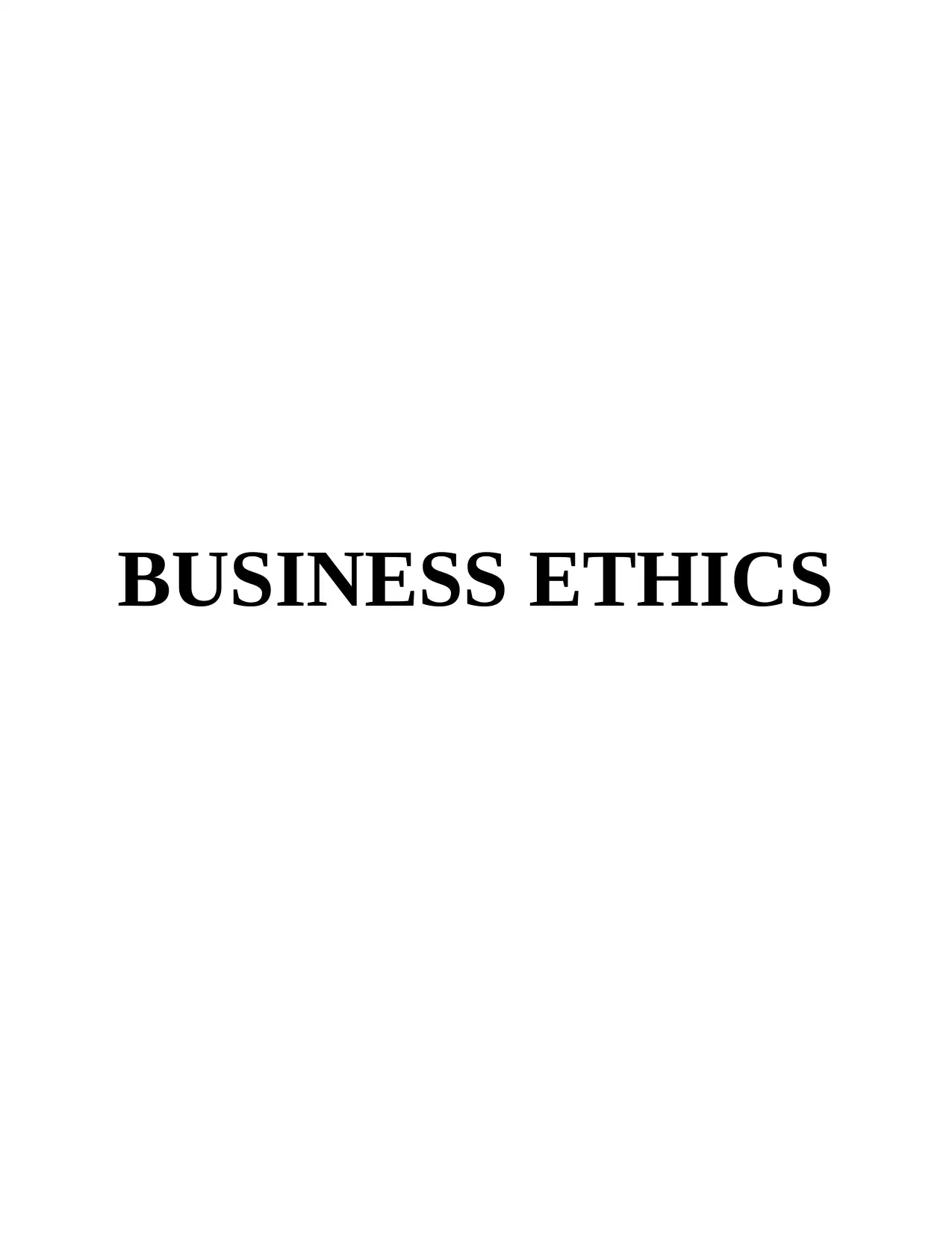
BUSINESS ETHICS
Paraphrase This Document
Need a fresh take? Get an instant paraphrase of this document with our AI Paraphraser
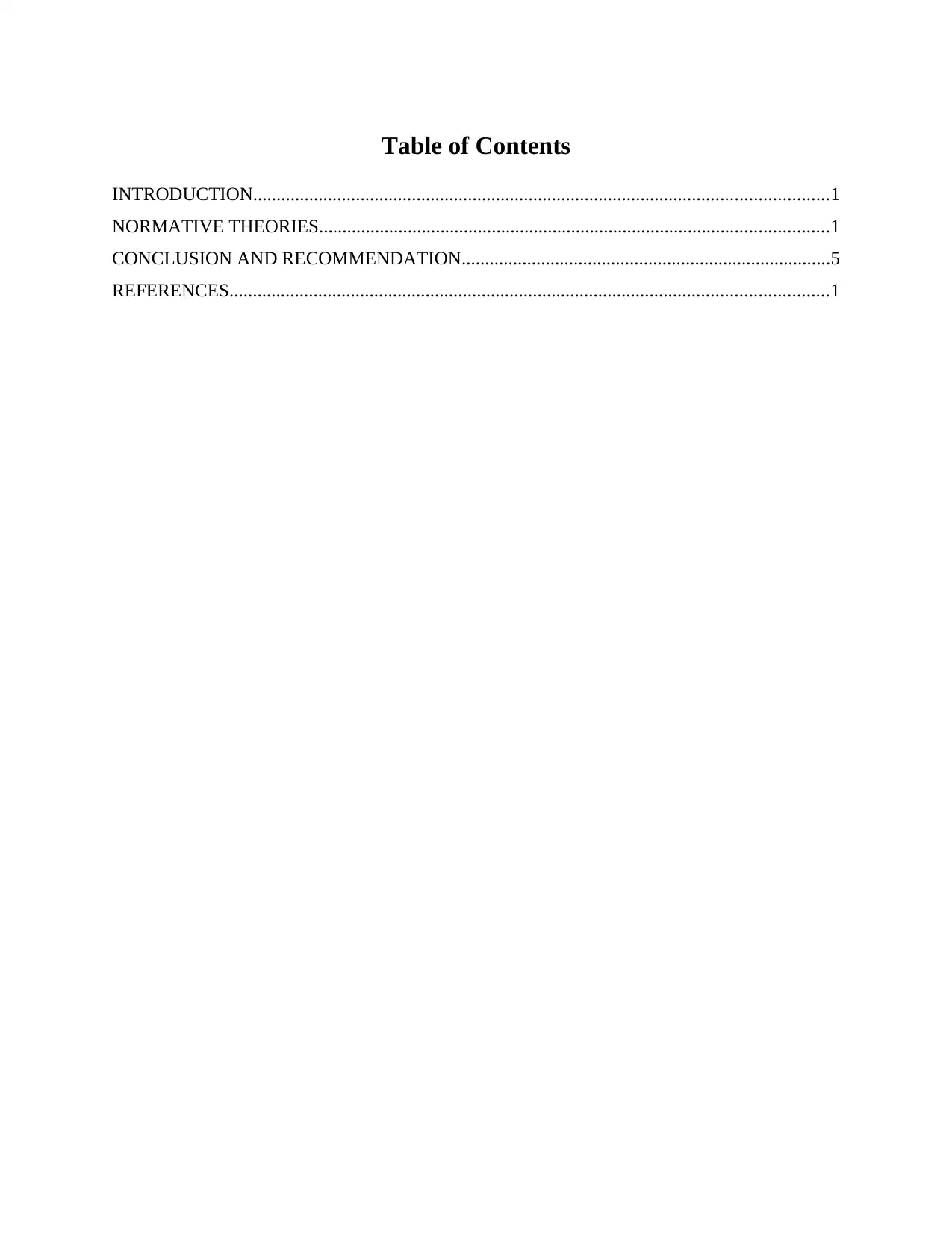
Table of Contents
INTRODUCTION...........................................................................................................................1
NORMATIVE THEORIES.............................................................................................................1
CONCLUSION AND RECOMMENDATION...............................................................................5
REFERENCES................................................................................................................................1
INTRODUCTION...........................................................................................................................1
NORMATIVE THEORIES.............................................................................................................1
CONCLUSION AND RECOMMENDATION...............................................................................5
REFERENCES................................................................................................................................1
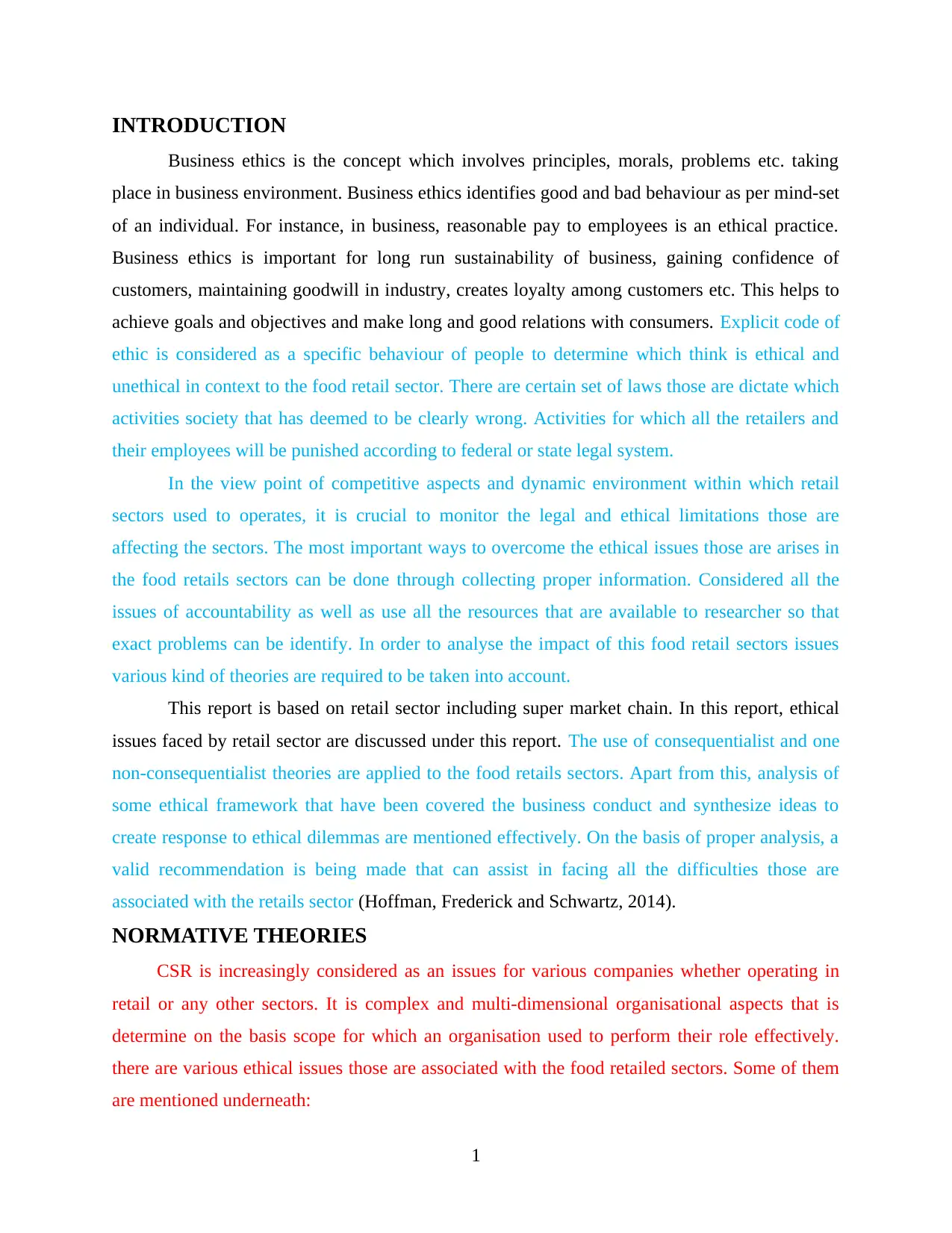
INTRODUCTION
Business ethics is the concept which involves principles, morals, problems etc. taking
place in business environment. Business ethics identifies good and bad behaviour as per mind-set
of an individual. For instance, in business, reasonable pay to employees is an ethical practice.
Business ethics is important for long run sustainability of business, gaining confidence of
customers, maintaining goodwill in industry, creates loyalty among customers etc. This helps to
achieve goals and objectives and make long and good relations with consumers. Explicit code of
ethic is considered as a specific behaviour of people to determine which think is ethical and
unethical in context to the food retail sector. There are certain set of laws those are dictate which
activities society that has deemed to be clearly wrong. Activities for which all the retailers and
their employees will be punished according to federal or state legal system.
In the view point of competitive aspects and dynamic environment within which retail
sectors used to operates, it is crucial to monitor the legal and ethical limitations those are
affecting the sectors. The most important ways to overcome the ethical issues those are arises in
the food retails sectors can be done through collecting proper information. Considered all the
issues of accountability as well as use all the resources that are available to researcher so that
exact problems can be identify. In order to analyse the impact of this food retail sectors issues
various kind of theories are required to be taken into account.
This report is based on retail sector including super market chain. In this report, ethical
issues faced by retail sector are discussed under this report. The use of consequentialist and one
non-consequentialist theories are applied to the food retails sectors. Apart from this, analysis of
some ethical framework that have been covered the business conduct and synthesize ideas to
create response to ethical dilemmas are mentioned effectively. On the basis of proper analysis, a
valid recommendation is being made that can assist in facing all the difficulties those are
associated with the retails sector (Hoffman, Frederick and Schwartz, 2014).
NORMATIVE THEORIES
CSR is increasingly considered as an issues for various companies whether operating in
retail or any other sectors. It is complex and multi-dimensional organisational aspects that is
determine on the basis scope for which an organisation used to perform their role effectively.
there are various ethical issues those are associated with the food retailed sectors. Some of them
are mentioned underneath:
1
Business ethics is the concept which involves principles, morals, problems etc. taking
place in business environment. Business ethics identifies good and bad behaviour as per mind-set
of an individual. For instance, in business, reasonable pay to employees is an ethical practice.
Business ethics is important for long run sustainability of business, gaining confidence of
customers, maintaining goodwill in industry, creates loyalty among customers etc. This helps to
achieve goals and objectives and make long and good relations with consumers. Explicit code of
ethic is considered as a specific behaviour of people to determine which think is ethical and
unethical in context to the food retail sector. There are certain set of laws those are dictate which
activities society that has deemed to be clearly wrong. Activities for which all the retailers and
their employees will be punished according to federal or state legal system.
In the view point of competitive aspects and dynamic environment within which retail
sectors used to operates, it is crucial to monitor the legal and ethical limitations those are
affecting the sectors. The most important ways to overcome the ethical issues those are arises in
the food retails sectors can be done through collecting proper information. Considered all the
issues of accountability as well as use all the resources that are available to researcher so that
exact problems can be identify. In order to analyse the impact of this food retail sectors issues
various kind of theories are required to be taken into account.
This report is based on retail sector including super market chain. In this report, ethical
issues faced by retail sector are discussed under this report. The use of consequentialist and one
non-consequentialist theories are applied to the food retails sectors. Apart from this, analysis of
some ethical framework that have been covered the business conduct and synthesize ideas to
create response to ethical dilemmas are mentioned effectively. On the basis of proper analysis, a
valid recommendation is being made that can assist in facing all the difficulties those are
associated with the retails sector (Hoffman, Frederick and Schwartz, 2014).
NORMATIVE THEORIES
CSR is increasingly considered as an issues for various companies whether operating in
retail or any other sectors. It is complex and multi-dimensional organisational aspects that is
determine on the basis scope for which an organisation used to perform their role effectively.
there are various ethical issues those are associated with the food retailed sectors. Some of them
are mentioned underneath:
1
⊘ This is a preview!⊘
Do you want full access?
Subscribe today to unlock all pages.

Trusted by 1+ million students worldwide
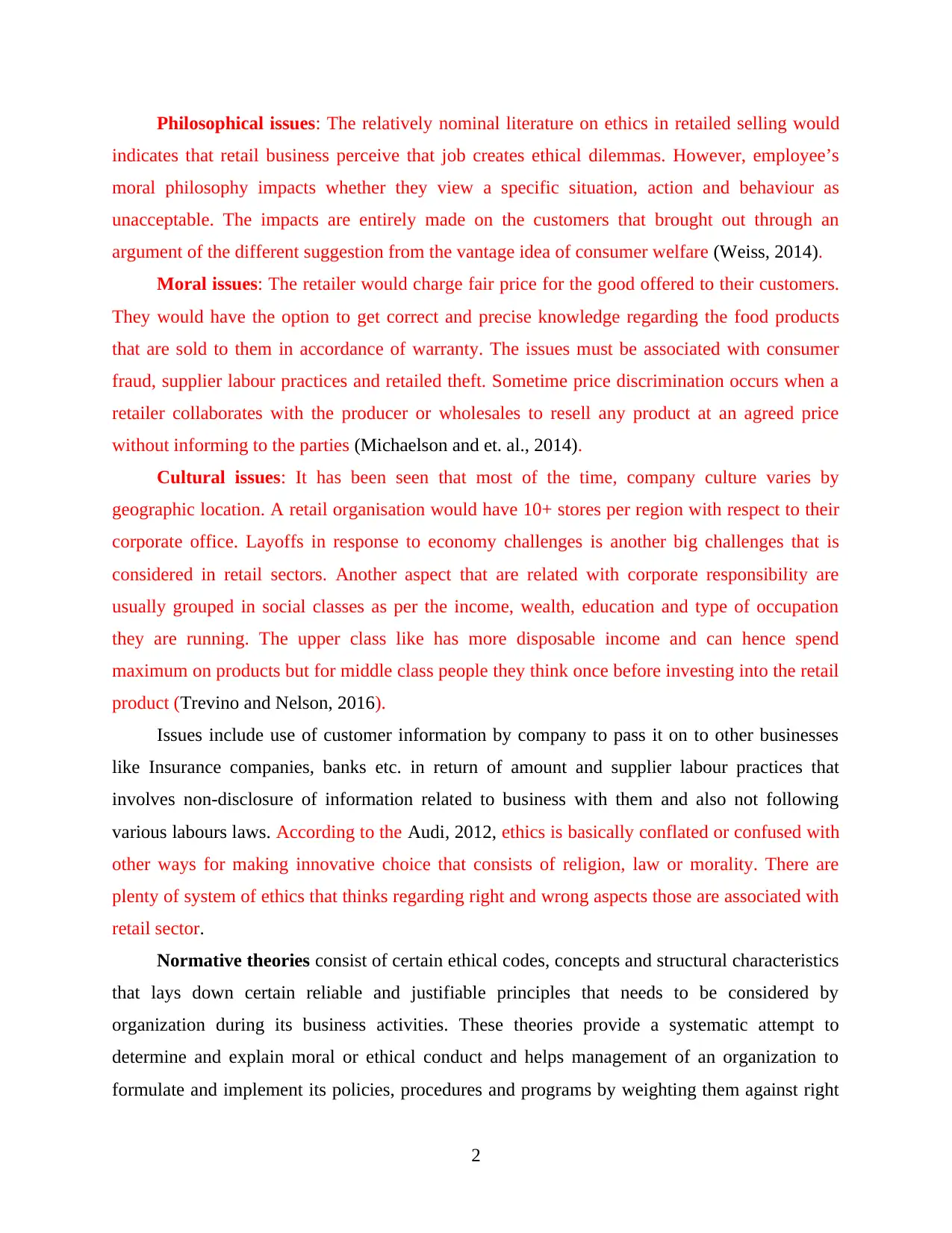
Philosophical issues: The relatively nominal literature on ethics in retailed selling would
indicates that retail business perceive that job creates ethical dilemmas. However, employee’s
moral philosophy impacts whether they view a specific situation, action and behaviour as
unacceptable. The impacts are entirely made on the customers that brought out through an
argument of the different suggestion from the vantage idea of consumer welfare (Weiss, 2014).
Moral issues: The retailer would charge fair price for the good offered to their customers.
They would have the option to get correct and precise knowledge regarding the food products
that are sold to them in accordance of warranty. The issues must be associated with consumer
fraud, supplier labour practices and retailed theft. Sometime price discrimination occurs when a
retailer collaborates with the producer or wholesales to resell any product at an agreed price
without informing to the parties (Michaelson and et. al., 2014).
Cultural issues: It has been seen that most of the time, company culture varies by
geographic location. A retail organisation would have 10+ stores per region with respect to their
corporate office. Layoffs in response to economy challenges is another big challenges that is
considered in retail sectors. Another aspect that are related with corporate responsibility are
usually grouped in social classes as per the income, wealth, education and type of occupation
they are running. The upper class like has more disposable income and can hence spend
maximum on products but for middle class people they think once before investing into the retail
product (Trevino and Nelson, 2016).
Issues include use of customer information by company to pass it on to other businesses
like Insurance companies, banks etc. in return of amount and supplier labour practices that
involves non-disclosure of information related to business with them and also not following
various labours laws. According to the Audi, 2012, ethics is basically conflated or confused with
other ways for making innovative choice that consists of religion, law or morality. There are
plenty of system of ethics that thinks regarding right and wrong aspects those are associated with
retail sector.
Normative theories consist of certain ethical codes, concepts and structural characteristics
that lays down certain reliable and justifiable principles that needs to be considered by
organization during its business activities. These theories provide a systematic attempt to
determine and explain moral or ethical conduct and helps management of an organization to
formulate and implement its policies, procedures and programs by weighting them against right
2
indicates that retail business perceive that job creates ethical dilemmas. However, employee’s
moral philosophy impacts whether they view a specific situation, action and behaviour as
unacceptable. The impacts are entirely made on the customers that brought out through an
argument of the different suggestion from the vantage idea of consumer welfare (Weiss, 2014).
Moral issues: The retailer would charge fair price for the good offered to their customers.
They would have the option to get correct and precise knowledge regarding the food products
that are sold to them in accordance of warranty. The issues must be associated with consumer
fraud, supplier labour practices and retailed theft. Sometime price discrimination occurs when a
retailer collaborates with the producer or wholesales to resell any product at an agreed price
without informing to the parties (Michaelson and et. al., 2014).
Cultural issues: It has been seen that most of the time, company culture varies by
geographic location. A retail organisation would have 10+ stores per region with respect to their
corporate office. Layoffs in response to economy challenges is another big challenges that is
considered in retail sectors. Another aspect that are related with corporate responsibility are
usually grouped in social classes as per the income, wealth, education and type of occupation
they are running. The upper class like has more disposable income and can hence spend
maximum on products but for middle class people they think once before investing into the retail
product (Trevino and Nelson, 2016).
Issues include use of customer information by company to pass it on to other businesses
like Insurance companies, banks etc. in return of amount and supplier labour practices that
involves non-disclosure of information related to business with them and also not following
various labours laws. According to the Audi, 2012, ethics is basically conflated or confused with
other ways for making innovative choice that consists of religion, law or morality. There are
plenty of system of ethics that thinks regarding right and wrong aspects those are associated with
retail sector.
Normative theories consist of certain ethical codes, concepts and structural characteristics
that lays down certain reliable and justifiable principles that needs to be considered by
organization during its business activities. These theories provide a systematic attempt to
determine and explain moral or ethical conduct and helps management of an organization to
formulate and implement its policies, procedures and programs by weighting them against right
2
Paraphrase This Document
Need a fresh take? Get an instant paraphrase of this document with our AI Paraphraser
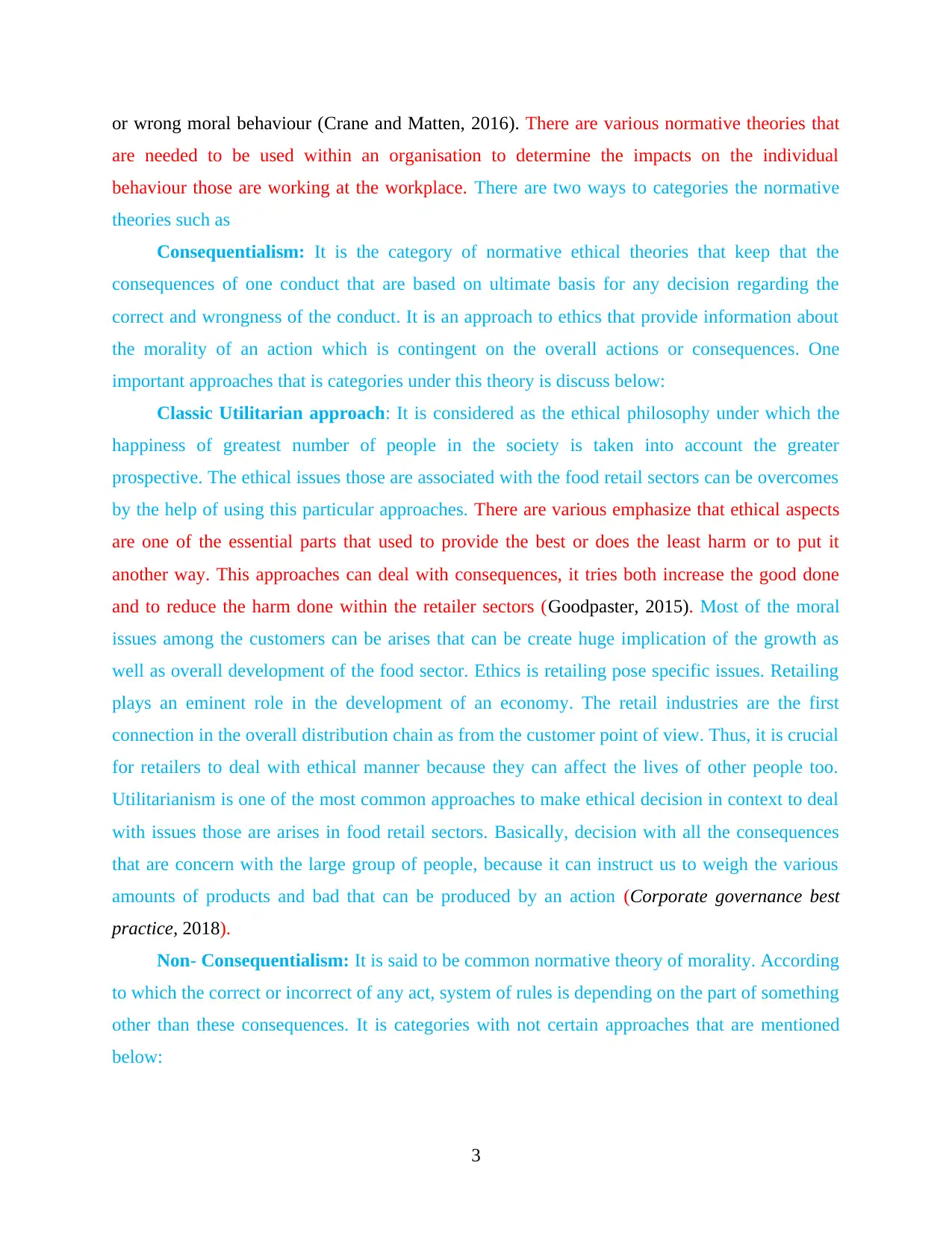
or wrong moral behaviour (Crane and Matten, 2016). There are various normative theories that
are needed to be used within an organisation to determine the impacts on the individual
behaviour those are working at the workplace. There are two ways to categories the normative
theories such as
Consequentialism: It is the category of normative ethical theories that keep that the
consequences of one conduct that are based on ultimate basis for any decision regarding the
correct and wrongness of the conduct. It is an approach to ethics that provide information about
the morality of an action which is contingent on the overall actions or consequences. One
important approaches that is categories under this theory is discuss below:
Classic Utilitarian approach: It is considered as the ethical philosophy under which the
happiness of greatest number of people in the society is taken into account the greater
prospective. The ethical issues those are associated with the food retail sectors can be overcomes
by the help of using this particular approaches. There are various emphasize that ethical aspects
are one of the essential parts that used to provide the best or does the least harm or to put it
another way. This approaches can deal with consequences, it tries both increase the good done
and to reduce the harm done within the retailer sectors (Goodpaster, 2015). Most of the moral
issues among the customers can be arises that can be create huge implication of the growth as
well as overall development of the food sector. Ethics is retailing pose specific issues. Retailing
plays an eminent role in the development of an economy. The retail industries are the first
connection in the overall distribution chain as from the customer point of view. Thus, it is crucial
for retailers to deal with ethical manner because they can affect the lives of other people too.
Utilitarianism is one of the most common approaches to make ethical decision in context to deal
with issues those are arises in food retail sectors. Basically, decision with all the consequences
that are concern with the large group of people, because it can instruct us to weigh the various
amounts of products and bad that can be produced by an action (Corporate governance best
practice, 2018).
Non- Consequentialism: It is said to be common normative theory of morality. According
to which the correct or incorrect of any act, system of rules is depending on the part of something
other than these consequences. It is categories with not certain approaches that are mentioned
below:
3
are needed to be used within an organisation to determine the impacts on the individual
behaviour those are working at the workplace. There are two ways to categories the normative
theories such as
Consequentialism: It is the category of normative ethical theories that keep that the
consequences of one conduct that are based on ultimate basis for any decision regarding the
correct and wrongness of the conduct. It is an approach to ethics that provide information about
the morality of an action which is contingent on the overall actions or consequences. One
important approaches that is categories under this theory is discuss below:
Classic Utilitarian approach: It is considered as the ethical philosophy under which the
happiness of greatest number of people in the society is taken into account the greater
prospective. The ethical issues those are associated with the food retail sectors can be overcomes
by the help of using this particular approaches. There are various emphasize that ethical aspects
are one of the essential parts that used to provide the best or does the least harm or to put it
another way. This approaches can deal with consequences, it tries both increase the good done
and to reduce the harm done within the retailer sectors (Goodpaster, 2015). Most of the moral
issues among the customers can be arises that can be create huge implication of the growth as
well as overall development of the food sector. Ethics is retailing pose specific issues. Retailing
plays an eminent role in the development of an economy. The retail industries are the first
connection in the overall distribution chain as from the customer point of view. Thus, it is crucial
for retailers to deal with ethical manner because they can affect the lives of other people too.
Utilitarianism is one of the most common approaches to make ethical decision in context to deal
with issues those are arises in food retail sectors. Basically, decision with all the consequences
that are concern with the large group of people, because it can instruct us to weigh the various
amounts of products and bad that can be produced by an action (Corporate governance best
practice, 2018).
Non- Consequentialism: It is said to be common normative theory of morality. According
to which the correct or incorrect of any act, system of rules is depending on the part of something
other than these consequences. It is categories with not certain approaches that are mentioned
below:
3
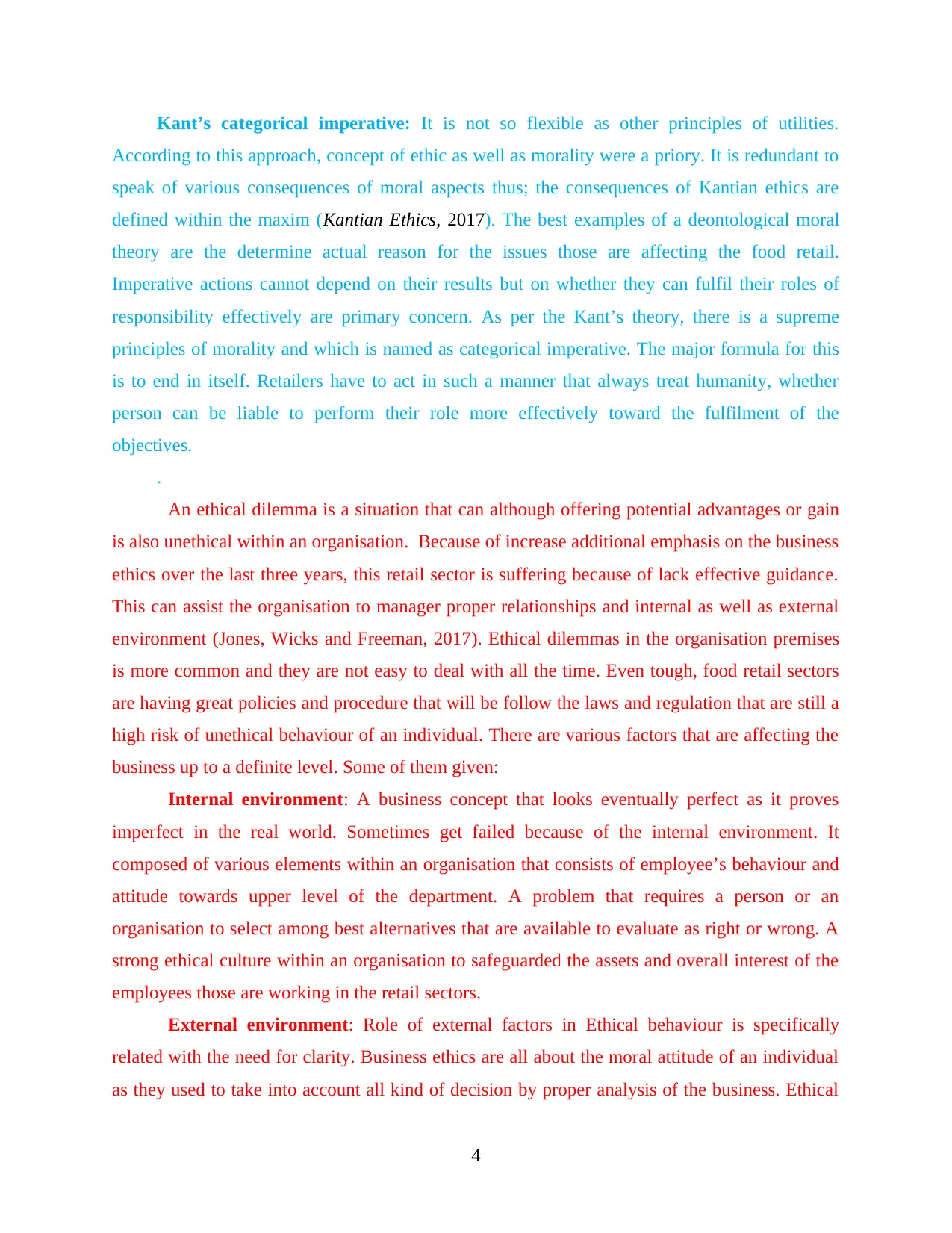
Kant’s categorical imperative: It is not so flexible as other principles of utilities.
According to this approach, concept of ethic as well as morality were a priory. It is redundant to
speak of various consequences of moral aspects thus; the consequences of Kantian ethics are
defined within the maxim (Kantian Ethics, 2017). The best examples of a deontological moral
theory are the determine actual reason for the issues those are affecting the food retail.
Imperative actions cannot depend on their results but on whether they can fulfil their roles of
responsibility effectively are primary concern. As per the Kant’s theory, there is a supreme
principles of morality and which is named as categorical imperative. The major formula for this
is to end in itself. Retailers have to act in such a manner that always treat humanity, whether
person can be liable to perform their role more effectively toward the fulfilment of the
objectives.
.
An ethical dilemma is a situation that can although offering potential advantages or gain
is also unethical within an organisation. Because of increase additional emphasis on the business
ethics over the last three years, this retail sector is suffering because of lack effective guidance.
This can assist the organisation to manager proper relationships and internal as well as external
environment (Jones, Wicks and Freeman, 2017). Ethical dilemmas in the organisation premises
is more common and they are not easy to deal with all the time. Even tough, food retail sectors
are having great policies and procedure that will be follow the laws and regulation that are still a
high risk of unethical behaviour of an individual. There are various factors that are affecting the
business up to a definite level. Some of them given:
Internal environment: A business concept that looks eventually perfect as it proves
imperfect in the real world. Sometimes get failed because of the internal environment. It
composed of various elements within an organisation that consists of employee’s behaviour and
attitude towards upper level of the department. A problem that requires a person or an
organisation to select among best alternatives that are available to evaluate as right or wrong. A
strong ethical culture within an organisation to safeguarded the assets and overall interest of the
employees those are working in the retail sectors.
External environment: Role of external factors in Ethical behaviour is specifically
related with the need for clarity. Business ethics are all about the moral attitude of an individual
as they used to take into account all kind of decision by proper analysis of the business. Ethical
4
According to this approach, concept of ethic as well as morality were a priory. It is redundant to
speak of various consequences of moral aspects thus; the consequences of Kantian ethics are
defined within the maxim (Kantian Ethics, 2017). The best examples of a deontological moral
theory are the determine actual reason for the issues those are affecting the food retail.
Imperative actions cannot depend on their results but on whether they can fulfil their roles of
responsibility effectively are primary concern. As per the Kant’s theory, there is a supreme
principles of morality and which is named as categorical imperative. The major formula for this
is to end in itself. Retailers have to act in such a manner that always treat humanity, whether
person can be liable to perform their role more effectively toward the fulfilment of the
objectives.
.
An ethical dilemma is a situation that can although offering potential advantages or gain
is also unethical within an organisation. Because of increase additional emphasis on the business
ethics over the last three years, this retail sector is suffering because of lack effective guidance.
This can assist the organisation to manager proper relationships and internal as well as external
environment (Jones, Wicks and Freeman, 2017). Ethical dilemmas in the organisation premises
is more common and they are not easy to deal with all the time. Even tough, food retail sectors
are having great policies and procedure that will be follow the laws and regulation that are still a
high risk of unethical behaviour of an individual. There are various factors that are affecting the
business up to a definite level. Some of them given:
Internal environment: A business concept that looks eventually perfect as it proves
imperfect in the real world. Sometimes get failed because of the internal environment. It
composed of various elements within an organisation that consists of employee’s behaviour and
attitude towards upper level of the department. A problem that requires a person or an
organisation to select among best alternatives that are available to evaluate as right or wrong. A
strong ethical culture within an organisation to safeguarded the assets and overall interest of the
employees those are working in the retail sectors.
External environment: Role of external factors in Ethical behaviour is specifically
related with the need for clarity. Business ethics are all about the moral attitude of an individual
as they used to take into account all kind of decision by proper analysis of the business. Ethical
4
⊘ This is a preview!⊘
Do you want full access?
Subscribe today to unlock all pages.

Trusted by 1+ million students worldwide
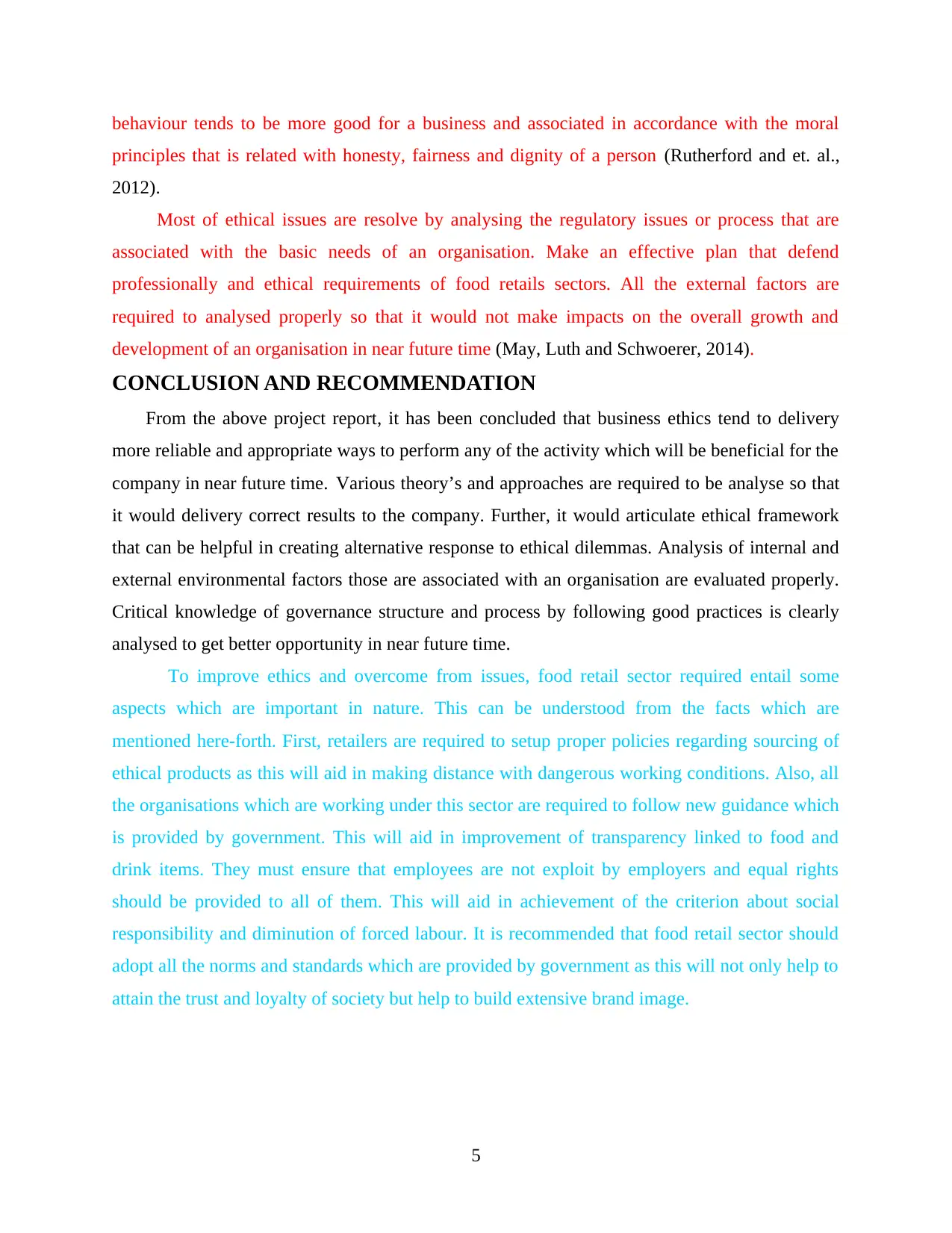
behaviour tends to be more good for a business and associated in accordance with the moral
principles that is related with honesty, fairness and dignity of a person (Rutherford and et. al.,
2012).
Most of ethical issues are resolve by analysing the regulatory issues or process that are
associated with the basic needs of an organisation. Make an effective plan that defend
professionally and ethical requirements of food retails sectors. All the external factors are
required to analysed properly so that it would not make impacts on the overall growth and
development of an organisation in near future time (May, Luth and Schwoerer, 2014).
CONCLUSION AND RECOMMENDATION
From the above project report, it has been concluded that business ethics tend to delivery
more reliable and appropriate ways to perform any of the activity which will be beneficial for the
company in near future time. Various theory’s and approaches are required to be analyse so that
it would delivery correct results to the company. Further, it would articulate ethical framework
that can be helpful in creating alternative response to ethical dilemmas. Analysis of internal and
external environmental factors those are associated with an organisation are evaluated properly.
Critical knowledge of governance structure and process by following good practices is clearly
analysed to get better opportunity in near future time.
To improve ethics and overcome from issues, food retail sector required entail some
aspects which are important in nature. This can be understood from the facts which are
mentioned here-forth. First, retailers are required to setup proper policies regarding sourcing of
ethical products as this will aid in making distance with dangerous working conditions. Also, all
the organisations which are working under this sector are required to follow new guidance which
is provided by government. This will aid in improvement of transparency linked to food and
drink items. They must ensure that employees are not exploit by employers and equal rights
should be provided to all of them. This will aid in achievement of the criterion about social
responsibility and diminution of forced labour. It is recommended that food retail sector should
adopt all the norms and standards which are provided by government as this will not only help to
attain the trust and loyalty of society but help to build extensive brand image.
5
principles that is related with honesty, fairness and dignity of a person (Rutherford and et. al.,
2012).
Most of ethical issues are resolve by analysing the regulatory issues or process that are
associated with the basic needs of an organisation. Make an effective plan that defend
professionally and ethical requirements of food retails sectors. All the external factors are
required to analysed properly so that it would not make impacts on the overall growth and
development of an organisation in near future time (May, Luth and Schwoerer, 2014).
CONCLUSION AND RECOMMENDATION
From the above project report, it has been concluded that business ethics tend to delivery
more reliable and appropriate ways to perform any of the activity which will be beneficial for the
company in near future time. Various theory’s and approaches are required to be analyse so that
it would delivery correct results to the company. Further, it would articulate ethical framework
that can be helpful in creating alternative response to ethical dilemmas. Analysis of internal and
external environmental factors those are associated with an organisation are evaluated properly.
Critical knowledge of governance structure and process by following good practices is clearly
analysed to get better opportunity in near future time.
To improve ethics and overcome from issues, food retail sector required entail some
aspects which are important in nature. This can be understood from the facts which are
mentioned here-forth. First, retailers are required to setup proper policies regarding sourcing of
ethical products as this will aid in making distance with dangerous working conditions. Also, all
the organisations which are working under this sector are required to follow new guidance which
is provided by government. This will aid in improvement of transparency linked to food and
drink items. They must ensure that employees are not exploit by employers and equal rights
should be provided to all of them. This will aid in achievement of the criterion about social
responsibility and diminution of forced labour. It is recommended that food retail sector should
adopt all the norms and standards which are provided by government as this will not only help to
attain the trust and loyalty of society but help to build extensive brand image.
5
Paraphrase This Document
Need a fresh take? Get an instant paraphrase of this document with our AI Paraphraser
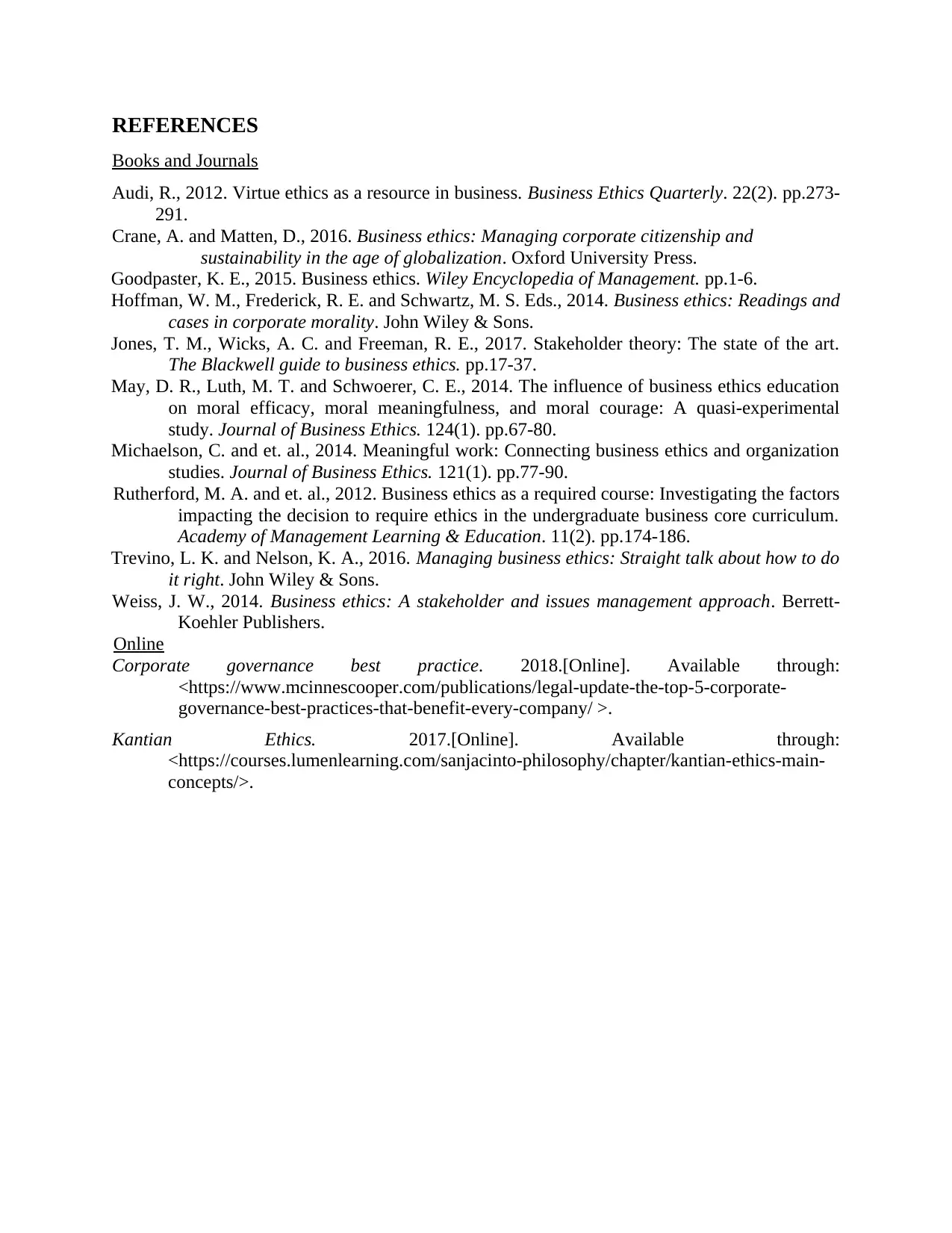
REFERENCES
Books and Journals
Audi, R., 2012. Virtue ethics as a resource in business. Business Ethics Quarterly. 22(2). pp.273-
291.
Crane, A. and Matten, D., 2016. Business ethics: Managing corporate citizenship and
sustainability in the age of globalization. Oxford University Press.
Goodpaster, K. E., 2015. Business ethics. Wiley Encyclopedia of Management. pp.1-6.
Hoffman, W. M., Frederick, R. E. and Schwartz, M. S. Eds., 2014. Business ethics: Readings and
cases in corporate morality. John Wiley & Sons.
Jones, T. M., Wicks, A. C. and Freeman, R. E., 2017. Stakeholder theory: The state of the art.
The Blackwell guide to business ethics. pp.17-37.
May, D. R., Luth, M. T. and Schwoerer, C. E., 2014. The influence of business ethics education
on moral efficacy, moral meaningfulness, and moral courage: A quasi-experimental
study. Journal of Business Ethics. 124(1). pp.67-80.
Michaelson, C. and et. al., 2014. Meaningful work: Connecting business ethics and organization
studies. Journal of Business Ethics. 121(1). pp.77-90.
Rutherford, M. A. and et. al., 2012. Business ethics as a required course: Investigating the factors
impacting the decision to require ethics in the undergraduate business core curriculum.
Academy of Management Learning & Education. 11(2). pp.174-186.
Trevino, L. K. and Nelson, K. A., 2016. Managing business ethics: Straight talk about how to do
it right. John Wiley & Sons.
Weiss, J. W., 2014. Business ethics: A stakeholder and issues management approach. Berrett-
Koehler Publishers.
Online
Corporate governance best practice. 2018.[Online]. Available through:
<https://www.mcinnescooper.com/publications/legal-update-the-top-5-corporate-
governance-best-practices-that-benefit-every-company/ >.
Kantian Ethics. 2017.[Online]. Available through:
<https://courses.lumenlearning.com/sanjacinto-philosophy/chapter/kantian-ethics-main-
concepts/>.
Books and Journals
Audi, R., 2012. Virtue ethics as a resource in business. Business Ethics Quarterly. 22(2). pp.273-
291.
Crane, A. and Matten, D., 2016. Business ethics: Managing corporate citizenship and
sustainability in the age of globalization. Oxford University Press.
Goodpaster, K. E., 2015. Business ethics. Wiley Encyclopedia of Management. pp.1-6.
Hoffman, W. M., Frederick, R. E. and Schwartz, M. S. Eds., 2014. Business ethics: Readings and
cases in corporate morality. John Wiley & Sons.
Jones, T. M., Wicks, A. C. and Freeman, R. E., 2017. Stakeholder theory: The state of the art.
The Blackwell guide to business ethics. pp.17-37.
May, D. R., Luth, M. T. and Schwoerer, C. E., 2014. The influence of business ethics education
on moral efficacy, moral meaningfulness, and moral courage: A quasi-experimental
study. Journal of Business Ethics. 124(1). pp.67-80.
Michaelson, C. and et. al., 2014. Meaningful work: Connecting business ethics and organization
studies. Journal of Business Ethics. 121(1). pp.77-90.
Rutherford, M. A. and et. al., 2012. Business ethics as a required course: Investigating the factors
impacting the decision to require ethics in the undergraduate business core curriculum.
Academy of Management Learning & Education. 11(2). pp.174-186.
Trevino, L. K. and Nelson, K. A., 2016. Managing business ethics: Straight talk about how to do
it right. John Wiley & Sons.
Weiss, J. W., 2014. Business ethics: A stakeholder and issues management approach. Berrett-
Koehler Publishers.
Online
Corporate governance best practice. 2018.[Online]. Available through:
<https://www.mcinnescooper.com/publications/legal-update-the-top-5-corporate-
governance-best-practices-that-benefit-every-company/ >.
Kantian Ethics. 2017.[Online]. Available through:
<https://courses.lumenlearning.com/sanjacinto-philosophy/chapter/kantian-ethics-main-
concepts/>.
1 out of 8
Related Documents
Your All-in-One AI-Powered Toolkit for Academic Success.
+13062052269
info@desklib.com
Available 24*7 on WhatsApp / Email
![[object Object]](/_next/static/media/star-bottom.7253800d.svg)
Unlock your academic potential
Copyright © 2020–2026 A2Z Services. All Rights Reserved. Developed and managed by ZUCOL.





